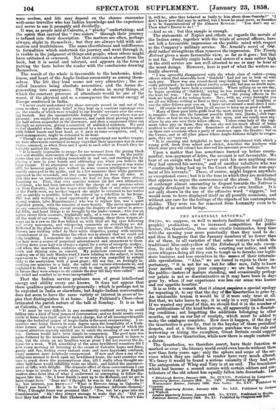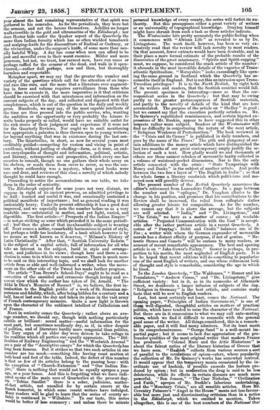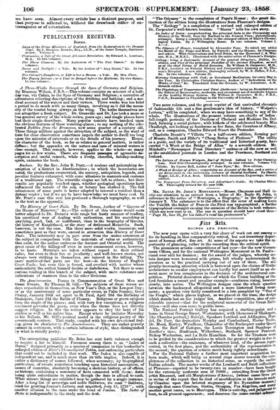THE QUARTERLY REVIEWS. * OWING, we suppose, as well to modern
facilities of rapid (typo- graphic) production, as to increased competition for public favour, the Quarterlies, those once erratic luminaries, keep time with the opening year more punctually than they used to do ; and thus it happens that the January numbers of no fewer than six of them, in all varieties of that sober vesture to which the traditional blue-and-yellow of the Edinburgh is the sole excep- tion, lie side by side on our table, courting our notice, and with syren whispers doing all they can to tempt us to forsake our legiti- mate business and lose ourselves in the mares of their intermin- able speculations. "Alas," we are foreed to rejoin to their im- portunacy, "it is not for us, but for idler men, fully to know your merits and enjoy your cornI ; we are but tasters for
I 1
the public—tasters of mature sten g, and occasionally perhaps our palate is not so discriminative as it may have been in days gone by, when if our experience was less our sense was keener and our appetite heartier."
It is so trite a remark that it almost raquires a special apology for repeating it, to say that the day of the Quarterlies is gone by. An intolerable truism it would be if it were only true at all. But that, we take leave to say, it is only in a very limited sense. If we wanted any proof of this, we should find it in the number of the publications of the kind before us, all apparently in a flourish- ing condition; not forgetting the additions belonging to other months, or not on our list of receipts, which must be added to make the catalogue complete. How does it happen, if the day of the Quarterlies is gone by, that in the heyday of those periodical despots, and at a time when private purchase was the rule and borrowing or hiring the exception, Great Britain could support only two or three Quarterlies, while now there is ample custom for a dozen.
The Quarterlies, we therefore assert, have their function as marked as ever ; the literary world could even less do without them now than forty years ago: only the sphere and scope of the ser- vioes which they are called to render have very much altered. We fancy it would be found a serious calamity if they had not. The antagonism of Whig and Tory is at an encl. The truculence which had become a second nature with certain editors and con- tributors of the old school has equally fallen into desuetude. last • Edinburgh Review, January 1858. No. CCXVII. Published by I.ongraans• Quarterly Review, January 1658. No. CCV. Published hy Murray. Westminster Review, January 1858. New Series. No. XXV. Published by
Chapman. British Quarterly Review, January 1856. No. LIM Published by Jackson and Walford.
London Quarterly Review, January 1838. No. XVIII. Published by Beylia. National Review, January 1858. No. XI. Pabliebed.by Chapman *WI Ball. year almost the last remaining representative of that spirit was 0.athered to his comrades. Is for the periodicals, they were but the armour, and not the heroes themselves. Achilles no longer walks terrible in the gold and ultramarine of the Edinburgh ; nor does Hector hide under the Quaker aspect of the Quarterly the more than Indian ferocity which has so often wielded tomahawk and scalping-knife for the discomfiture of Radical or Cockney, or the vivisection under the surgeon's knife, of some more than usu- ally hateful "Whig. A day has come when men can afford to be just and merciful even to their worst enemies. Milder and more generous, but not, we trust, less- earnest men, have run races or perhaps raffled for the armour of the dead, and walk in it open- vizored,—rather dull perhaps, now and then, but thoroughly harmless and respectable. Metaphor apart, we may say that the greater the number and variety of the questions which call for the attention of an impe- rial race like ours, and the more that a literature ever augment- ing in force and volume requires surveillance from those who have time to execute it, the more imperative is it that criticism should be exercised with that minuteness and information on the current subjects of the day, and collected and digested with that completeness, which is out of the question in the daily and weekly press. Hundreds, we may say, of the most capable intellects of the time are thus pressed into the public service, who, wanting the ambition or the opportunity or very probably the leisure to write books properly so called, would have no suitable outlet for the rich stores of their judgment and experience if it were not for the Quarterly Reviews. Nor ought we to omit mentioning haw appropriate a pahestra is thus thrown open to young writers; far beyond anything that was in existence during the last cen- tury. The Quarterlies, in short, as now for several years most creditably guided—competing for custom and vieing in point of excellence, without jostling or chaffing—form, as it were, an end- less encyclopedia of thought and information, political, artistic, and literary, retrospective and prospective, which every one has occasion to consult, though no one gathers their whole array on his shelves, or reads them from cover to cover, as was the cus- tom when authorship was a mystery, when good books were rare and dear, and reviews of this class a novelty of which nobody thought he could have enough.
Proceeding to notice the accumulations on our table, we take them in the order of seniority.
The Edinburgh enjoyed for some years not very distant, we suppose in right of its ancient prowess, an admitted privilege to be dull : learned and useful it was, and occasionally contained a political manifesto of importance ; but as general reading it was undeniably heavy. Under its present editorship it has a good deal improved, and we especially note the number before us as a very readable one—substantial in matter, and yet light, varied, and digestible. The first article—" Prospects of the Indian Empire" —is not\so striking as some which preceded it in the same periodi- cal; but' then the gloss of that inexhaustible subject is wearing off. Next comes a notice, remarkably harmonious in point of style, but perhaps a trifle too laudatory, of a book which however is by no means so well known as it deserves, " Milman's History of Latin Christianity." After that, "Scottish University Reform" is the subject of a capital article, full of information for all who take an mt,erest in the subject, lucid in style and arrange- ment, and judicious in its views ; though here and there a con- clusion is come to in which we cannot concur. There is much more to be said on this interesting topic, and we shall look for another article from so able and well-informed a writer, when the move- ment on the other side of the Tweed has made further progress.
The article "Tom Brown's School-Days" ought to be read as a corrective of the onesided and erroneous though loving and re- verent view which the author has taken of Dr. Arnold. "The Abbe le Dieu's Memoirs of Bossuet " is, we believe, the first in- troduction to the English public of a work of St. Simonian mi- nuteness and fidelity, which, after being hidden for a century and, a. half, has at last seen the day and taken its place in the vast army of French contemporary memoirs. Quite a new light is thrown upon the character of the sublimest intellect of Catholicism and of France.
Next in seniority comes the Quarterly ; rather above an ave- rage number, we should say, though with nothing particularly subtile or brilliant: sound matter—useful information for the most part, but sometimes needlessly dry, as if, in utter despair of politics, and of literature hardly more congenial than politics, the Tor/ organ of an elder day were driven to take refuge in the realities which all parties can equally appreciate. The " Dif- ficulties of Railway Engineering" and the "Woolwich Arsenal" are a pair of the "descriptive essays" for which the Quarterly has long been famous. But it strikes us that two such articles in one number are too much—something like having roast mutton at both head and foot of the table. Indeed, the defect of this number is that so few of its articles belong to the passing hour: with the exception of " Church-Extension " and Our Indian Em- pire," there is nothing that would not be equally apropos ayear ago, or a year hence. And this is forgetting what we have indi- cated. as one of the main uses of Quarterlies at the present day. On "Tobias Smollet " there is a sober, judicious, matter- of-fact article, not uncalled for by certain sneers at the Scotch humorist, in which some recent writers have indulged. Many readers will be glad to learn that the series of county ar- ticles is continued in "Wiltshire." To our taste, this series would be better if less summary ; • and unless there be minute
personal knowledge of every county, the series will forfeit its au- thority. But this presupposes either a great variety of writers or an universality of topographical knowledge. Drayton himself might have shrunk from such a task as these articles indicate.
The Westminster hits pretty accurately the public feeling when it commences with "African Life" as revealed to us by Dr. Livingstone. The work itself, however, has been so very ex- tensively read that the review will lack novelty to most readers. On that account, fewer extracts would have been desirable, and in their place a more formal estimate of the probable results of the discoveries of the great missionary. "Spirits and Spirit-rapping" must, we suppose, be considered the crack article of the number : it abounds in the most incredible details of the vagaries of Trans- atlantic Spiritualism. "Morayshire" looks exceedingly like open- ing the same ground in Scotland which the Quarterly has as- sumed to itself in England. But is not this an intrusion upon Trans- Tweedian privileges ? It is to the North British, by right both of its writers and readers, that the Scottish counties would fall. The present specimen is interesting—more so than the cor- respondent series in the Quarterly but that may be owing partly to the greater picturesqueness of Scottish materials, and partly to the novelty of details of the kind that are here accumulated. The purpose of the article on " Shelley " is good ; but we cannot say that the execution perfectly satisfies us. Mr. De Quincey's republished reminiscences, and certain bigoted ex- pressions of Mr. Ruskin, appear to have suggested this in other respects rather worn subject. Readers of the Westminster will find no difficulty in conjecturing the nature of the next article, "Religious Weakness of Protestantism." The book reviewed in the " Crisis and. its Causes" is published in daily numbers, and goes by the name of the Times! The pith and pungency of cer- tain additions to the money article which have distinguished the last two months of our great contemporary amply justify the se- lection of such a text. How gladly would we and thousands of others see those earnest rebukes of mercantile laxity collected in a volume of waistcoat-pocket dimensions. Nor is this the only article connected with the crisis : "State Tamperings with Money and Banks" is the subject of another article. And. perdu between the two lies a layer of "The English in India" ; so that the whole forms a literary sandwich which politicians and mo- neyed men will greedily devour. The present number of the British Quarterly announces the editor's retirement from Lancashire College. In a page between the number and its "epilogue," Dr. Vaughan alludes to the change in his position, and promises that his contributions to the Review shall be increased, the relief from collegiate duties allowing greater leisure for composition. As for the number, we cannot say that it is above the average, but the subjects are well selected. "India," and "Dr.. Livingstone,' and "The Crisis 'T we have as a matter of course ; all readable artielee. " Projected Communication with the East" is accept- able after the rather partisan article in a recent Quarterly. A notice of " Freytag's Debit and Credit" balances one of De Foe ; a writer with whom the German expounder of mercantile morals has a distant affinity of purpose, if not of genius. "Me- teoric Stones and Comets" will be curious to many readers, on account of recent remarkable appearances. The best and opening article is on " John Gower's Poetry." Gower is perhaps, in pro- portion to his merits, the most neglected of English poets. It is to be hoped that recent editions will do something to popularize one of the most English of writers, and one whose refinement both of thought and style is remarkable, considering the age in which he lived.
To the London Quarterly, "The Waldenses," "Homer and his Translators," "Andrew Crosse," and "Dr. Livingstone," give sufficient variety : but in it, as in its namesake of Albemarle Street, we desiderate a larger infusion of subjects of the day. "Religion in Germany" is the best article, and contains many facts that will be new to English readers. Last, but most certainly not least, comes the National. The opmiing paper, "Principles of Indian Government," is one of thing well-digested, thoughtful articles on matters of practical polities, which have tended to raise the character of the National. But there are in it concessions to what we may call ante-mutiny views, which we find it difficult to reconcile with the genera/ good sense of the writer. All things considered, this is a remark- able paper, and it will find many admirers. Not its least merit is its comprehensiveness. "George Sand" is a well-meant im- partial paper ; but it seems to lack due appreciation of the pro- founder qualities of the most original writer that modern France has produced. "Colonel Mare and the Attic Historians" is about the fair* notice of the literary historian of Greece tba.t we have seen. " Hagan& " collects from various sources a sort of parallel to the revelations of opium-eaters, whose popularity the collection of Mr. De (inincey's works has somewhat revived. It would appear that the temporary mania occasioned by the in- ordinate use of hashish, if possible exceeds the horrors pro- duced by opium ; but in moderation the drug is said to be less deleterious, while its effects in certain diseases are much more powerful. Ben Jonson," "The Czar Nicholas," "Civilization and Faith," apropos of Mr. Buckle's laborious undertaking and the "Monetary Crisis," are all sensible articles. Here Mr: Coventry Patmore "Angel in the House" meets not less favour- - able but more just and discriminating criticism than in a notice in the Edinburgh, which we omitted to mention. Taken altogether, this is one of the best numbers of the National that
we have seen. Almost every article has a distinct purpose, and that purpose is adhered to, without the drawback either of ex- travagance or of estentation.




































 Previous page
Previous page